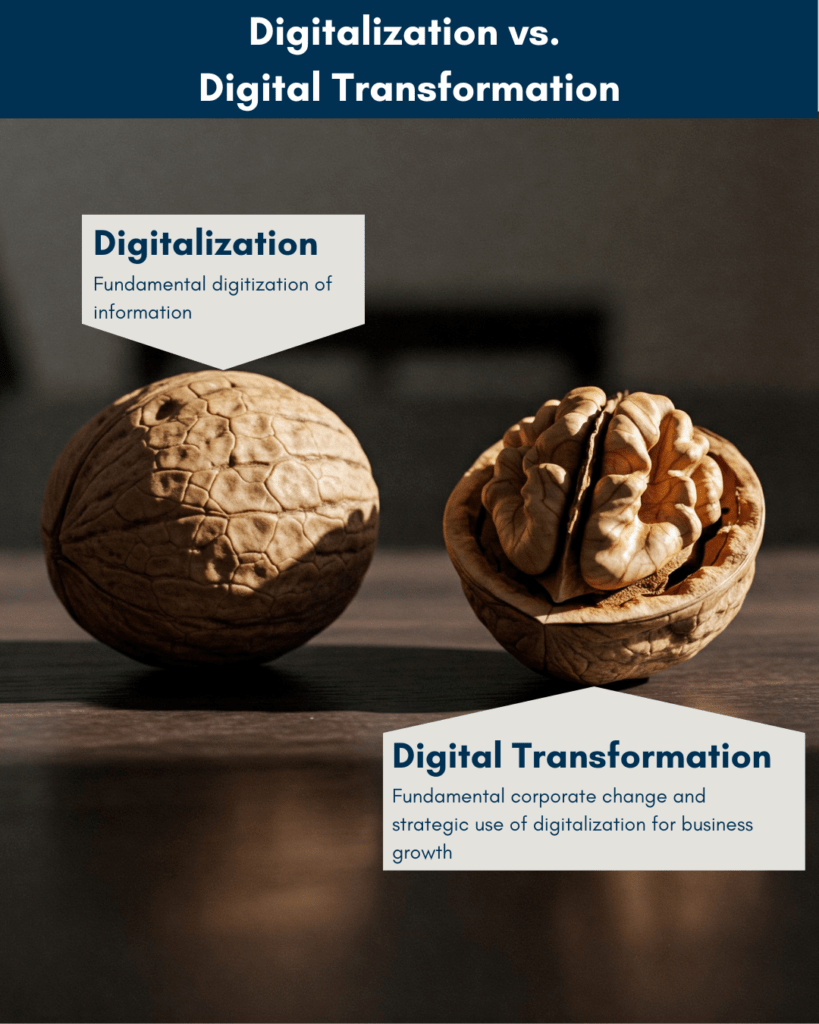What exactly is digitalization?
Let’s talk about digitization! Even if you may think you already know what digitalization is and how it works, it’s worth taking a closer look. I promise!
Originally, the word digitize described the conversion of analog things (files, papers, etc.) and processes into a digital form. But as with the introduction of the steam engine in 1769, digitization did not stop there. James Watt’s improved invention ushered in the industrial revolution in the 18th century and fundamentally changed production, transportation and society. Similarly, digitalization has been revolutionizing the economy and everyday life since the 1990s by automating processes, creating new business models and profoundly changing the way people work and communicate. Both developments mark historic turning points that are breaking up existing structures and ushering in a new era of progress.

Difference between digitalization and digital transformation
At first glance, they appear similar, but a closer look reveals the difference. Digitalization is like cracking a walnut – it opens up access to digital information. Digital transformation, on the other hand, goes deeper and uses this information to change the company from the inside out, creating new growth opportunities and thus strategically transforming the company.

Why it will still be necessary to talk about digitalization in 2025
Against this backdrop, it becomes clear why digitalization has been a central topic for years, but why we still need to talk about what digitalization actually is. This is because many companies are still at different stages of this transformation process. In addition, technological developments are constantly advancing and new challenges and opportunities are constantly emerging. It is therefore essential (even if it sometimes seems tedious) to continuously address the topic in order to ensure competitiveness and remain relevant as a company on the market.
Why companies should seize the opportunities now
There are a number of good reasons why companies should stop thinking about digitalization and what it actually is and start taking action. Here are the most important ones.
Attractive working conditions and employee retention are key benefits of digitalization. By creating modern and flexible working environments, such as remote working options and digital collaboration tools, companies increase employee satisfaction and promote long-term loyalty. This flexibility also enables companies to search for the best talent worldwide from any location and put together international teams of experts. Digitalization thus creates a win-win situation in which companies can strengthen their competitiveness and employees can achieve their professional goals.

Ensure competitiveness: In an increasingly digitized world where customers expect seamless, personalized and instant services, the ability to digitally transform is no longer an option, but a necessity. Companies that fail to embrace this change risk being overtaken by more agile competitors.
New business models: Customers today expect more than just a product or service; they are looking for a holistic digital experience. Companies that invest in digital technologies and optimize their processes can not only secure their competitiveness, but also tap into new growth opportunities. Digitalization creates innovative opportunities to offer products and services that were previously unthinkable.
Increased efficiency: Digital processes reduce manual activities, minimize sources of error and accelerate workflows. This leads to higher product quality, cost savings and enables resources to be deployed in a more targeted manner. Collaboration within teams also improves, as digital tools enable more efficient communication and coordination.
Data-driven decisions: Digital technologies make it possible to collect and analyze large amounts of data, enabling well-founded business decisions to be made and market trends to be identified at an early stage. At the same time, digitalization promotes a greater willingness to innovate, as companies can react more flexibly to market changes through the use of new technologies.
Advantages of digitalization
If we stick with the comparison of the steam engine, it is clear to everyone that those companies that resisted this invention were the economic losers of the Industrial Revolution. We are seeing similar processes now in the age of digitalization. For the reasons mentioned above, the advantages of digitalization are as follows:
Cost savings & increased efficiency: Digitalization leads to a reduction in production costs by automating and optimizing processes. At the same time, improved insights into data and processes give companies a more sound basis for making decisions about future measures.
Customer satisfaction: Personalized offers and improved service increase customer satisfaction and loyalty. In addition, reduced response times to customer feedback allow products and services to be adapted more quickly to the needs of the target group.
Flexibility: Digital companies can react more quickly to market changes and adapt their strategies accordingly. At the same time, entire supply chains benefit from end-to-end integration, which makes processes more efficient and flexible.
Scalability: Digital solutions make it possible to scale business processes without proportionally increasing costs. Optimized manufacturing processes also ensure that products can be brought to market faster, giving companies a competitive edge.

Challenges along the way
Challenges and obstacles get in the way of every transformation. If you are aware of them, you can prepare yourself. And one thing is also clear: the challenges along the way are definitely worth the result.

Cultural change: Companies must promote a culture that supports openness to change and continuous learning. Proactive change management is fundamental here.
Technology selection: The correct selection and implementation of suitable technologies requires specialist knowledge and strategic planning.
Employee training: It is essential to train employees in the use of new digital tools and involve them in the change process.
Data security: Digitalization increases the amount of sensitive data that needs to be protected from cyber attacks.
How the BAMAC Group supports you with digitalization
The BAMAC Group understands the complexity and individual requirements associated with digitalization. We offer customized solutions that are tailored to your specific needs:
- Consulting and strategy development: Together, we develop a digital roadmap that supports your business goals.
- Implementation of modern technologies: We support you in the selection and introduction of suitable digital tools and systems.
- Training and change management: Our experts train your employees and support the cultural change in your company.
- Security solutions: We develop concepts that protect your data from potential threats.
With the BAMAC Group as your partner, you can master the challenges of digitalization and make the most of the opportunities that arise.
Need Help?
Monday through Friday from 08:00 - 18:00
Current articles on Digitalization in our blog




